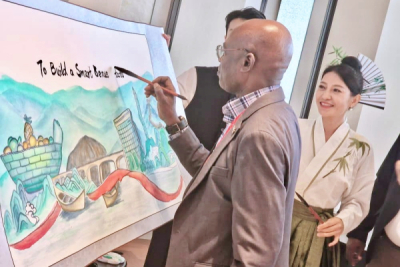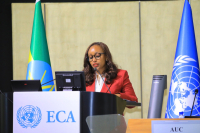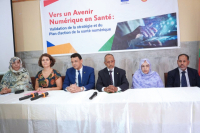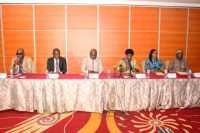
Tech (802)
African nations are undergoing a profound digital transformation, with increasing numbers of people coming online, and economies and societies becoming more tech-dependent. This rapid digital growth is expanding opportunities for cybercriminals, making cybercrime one of the continent's most rapidly escalating threats.
The Nigeria Police Force apprehended on November 2, 2024, 130 suspects over alleged involvement in cybercrimes and activities that threaten national security. The suspects include 113 foreign nationals-predominantly Chinese and Malaysian - as well as 17 Nigerian collaborators.
Force Public Relations Officer, ACP Olumuyiwa Adejobi, confirmed that police are conducting “thorough investigations and scientific analysis” of evidence gathered from the suspects. “The suspects will be charged to court upon conclusion of our investigations,” he stated, pledging to provide further updates on the case’s progress.
This crackdown is crucial as cybercrime continues to escalate in Nigeria and across Africa, posing severe economic threats. The INTERPOL African Cyberthreat Assessment Report 2024 highlights that the continent lost over $4 billion annually to cybercrime in 2021. By 2023, Africa experienced a 23% year-on-year increase in average weekly cyberattacks per organization—the highest rate globally.
Furthermore, the Cybersecurity Experts Association of Nigeria (CSEAN) revealed in its National Cyberthreat Forecast 2024 that in 2023, Nigeria faced a sharp rise in ransomware attacks, marking it as the year's top cyber threat. This surge was fueled by ransomware-as-a-service, allowing even low-skilled individuals to launch complex attacks. Active groups like ALPHV, 0XXX Virus, DJVU, and the Cobalt Strike toolkit highlighted the attacks' diversity. Both public and private sectors suffered, incurring losses in the billions of Naira due to operational disruptions and costly recovery.
The operation was executed by the Nigeria Police Zone 7 Command in Abuja. Under the supervision of AIG Benneth Igweh and the National Cybercrimes Centre led by CP Ifeanyi Henry Uche, officers targeted a building in the Next Cash and Carry area of Jahi, Abuja, where suspects reportedly used computers and advanced equipment for cybercriminal activities.
This operation underscores the Nigeria Police Force's ongoing commitment to tackling cybercrime and enhancing national security amidst rising digital threats across the region.
Hikmatu Bilali
In response to rising traffic violations, several countries are turning to technology to enhance road safety. Video-based ticketing is emerging as a promising tool to improve compliance with traffic laws and deter risky driving behaviors.
Seychelles Vice President Ahmed Afif announced last week, the upcoming piloting of a digital road monitoring system based on video ticketing to enhance road safety in the country.
Speaking at a cabinet press briefing on October 31st, he explained: The system “will provide the government with a lot of information, as we have seen nowadays people are driving without a valid license in addition to other illegal activities happening on the roads.”
The said system will utilize public surveillance cameras to enforce traffic laws remotely. When a violation is detected, an image of the vehicle is captured, identifying its make and reading its license plate number. A traffic officer can then issue an electronic ticket remotely, which is sent to the driver via message. Targeted infractions include speeding, using a phone while driving, and not wearing a seatbelt.
The eight-week pilot project will be launched in the Roche Caïman district on Mahé Island. During this phase, authorities will assess and fine-tune the technology to fit local needs. The trial results will be critical, guiding future infrastructure planning and traffic law enforcement. If successful, the system may be permanently implemented in partnership with Australian technology firm Acusensus.
This initiative is part of the government’s strategy to combat dangerous driving behaviors. If adopted, it will target key causes of road insecurity, particularly in urban areas, and promote lasting changes in driver behavior. The system would also streamline and accelerate the processing of violations, reducing the burden on law enforcement and increasing the efficiency of traffic law enforcement.
Samira Njoya
As part of its digital economy development plan, Nigeria is placing a strong emphasis on securing strategic partnerships. Each state in the country is ramping up efforts to deliver high-quality digital services to its citizens.
On Wednesday, October 30, Benue State Governor Hyacinth Iormem Alia (photo, center) announced a strategic partnership with Chinese tech group Huawei to accelerate digital transformation across the region. This agreement aims to modernize Benue's infrastructure, boost its economy, and improve the quality of life for its residents.
“This partnership with Huawei will revolutionize our state's infrastructure, enhance security, improve education [and] healthcare, and create countless job opportunities for our people. We must be intentional about the development of our state, for ourselves [and] future generations,” the governor explained on X (formerly Twitter).
The initiative is part of a broader effort to establish Benue State as a digital hub in Nigeria. It follows a recent agreement with EVNT Technologies, a Saudi-based IT company, to transform Benue’s technological landscape.
The Huawei partnership is expected to bolster local digital initiatives, particularly the Benue Tech Skills program, which aims to create over 50,000 jobs by training young people in essential digital skills. The program includes training in coding, advanced data analysis, UI/UX design, digital marketing, and e-commerce—all critical skills for the global digital economy.
These efforts align with the goals set by Nigeria’s Federal Ministry of Communications, Innovation, and Digital Economy under its strategic plan, “Accelerating our Collective Prosperity through Technical Efficiency.” This plan seeks to raise the digital sector’s contribution to Nigeria’s GDP to 22% by 2027, positioning the country as a leader in digital economy and tech innovation in Africa.
Samira Njoya
After supporting the development of around twenty promising startups, global accelerator Techstars has announced its withdrawal from Nigeria, a country where the startup ecosystem is experiencing rapid growth.
Techstars, a global startup accelerator and venture capital firm, is ending its operations in Nigeria after two years. The decision follows the conclusion of its partnership with ARM Labs, the Nigerian innovation entity with which it launched the ARM Labs Lagos Techstars Accelerator program.
“Techstars’ partnership with ARM Labs has ended, and we will not proceed with a third ARM Labs Lagos Techstars Accelerator Program. The first two cohorts featured outstanding companies and founders, supported by a dedicated group of mentors.We remain optimistic about collaborating with the local startup community to maintain our presence in this vibrant innovation hub,” said Matthew Grossman, Techstars’ global Chief Brand and Communications Officer.
Techstars and ARM Labs partnered in December 2022 to create an accelerator program to support early-stage African startups. Over two cohorts, the program added 24 startups to the Techstars portfolio, each receiving up to $120,000 in funding.
Techstars’ exit from Nigeria comes as the accelerator adjusts its finances, recently cutting 17% of its global workforce. This move raises concerns about the impact on Nigeria’s startup ecosystem, particularly regarding access to crucial resources and support. However, startups already funded through the ARM Labs Lagos Techstars Accelerator will remain part of Techstars’ portfolio and continue to benefit from its global network.
Samira Njoya
Dans plusieurs pays, le service postal occupe une place clé dans l’économie. Cependant, cette institution publique a progressivement perdu de son influence en raison d’un manque de vision stratégique. Aujourd’hui, grâce aux TIC, il devient possible de la réinventer pour répondre aux besoins actuels.
La Cameroon Postal Services (Campost), un opérateur public postal du Cameroun, a signé le vendredi 1er novembre un partenariat stratégique avec FindMe, une start-up camerounaise spécialisée dans l’identification et la géolocalisation. Cette collaboration vise à résoudre le problème de localisation au Cameroun, où une grande majorité de la population ne dispose pas d’une adresse postale officielle.
« Avec le boom de l'e-commerce, il est important pour le service postal de se réinventer afin de mieux satisfaire les clients, en répondant aux besoins de livraison jusqu’au dernier kilomètre et en optimisant nos services financiers grâce à une meilleure identification de nos clients bancaires, en conformité avec les exigences de KYC (Know your customer) », a déclaré Pierre Kaldadak (photo, à droite), directeur général de la Campost.
L'initiative s'inscrit dans la vision de modernisation et de transformation de la poste camerounaise. Elle fait suite à plusieurs mois de collaboration entre la Campost et la start-up FindMe, permettant l’implantation de cette solution au Cameroun depuis juillet 2024. Les premiers travaux ont également permis au gouvernement de créer des codes postaux couvrant l’ensemble du territoire national. Grâce au partenariat, chaque citoyen camerounais et chaque entreprise camerounaise peuvent désormais générer gratuitement une adresse postale en seulement deux minutes via l’application mobile de FindMe. Cette adresse fournit des informations précises, notamment le numéro d’occupation, le nom de la rue, le code postal et la ville.
Au Cameroun, ce système numérisé devrait notamment améliorer l'efficacité des services de secours et des forces de sécurité, accélérer le développement de l’e-commerce et des services postaux, et faciliter les opérations des services fiscaux et fonciers, contribuant ainsi au développement économique national. L’objectif plus large est de créer un référentiel national d’adressage sur lequel les services publics pourront s’appuyer pour déployer leurs diverses opérations.
Samira Njoya
Lire aussi:
Investing in digital skills accelerates regional tech development and prepares African nations for a digital future. This approach helps address critical challenges. Additionally, it tackles the region’s high youth unemployment, creating more opportunities for the next generation.
Nigeria announced a N2.8 billion ($1.7 million) commitment from Google to support the digital economy. The investment was led by Matt Brittin, Google’s President of EMEA Business & Operations. Announced on October 31 by the Minister of Communications, Innovation, and Digital Economy, this commitment aligns with Nigeria’s Strategic Blueprint for Digital Transformation.
The minister of Communications, Innovation, and Digital Economy commented on the move saying, “I appreciate the entire Google team for betting big on our technology ecosystem and their continued support. I look forward to building on our partnership, as we continue on our path of Digital Transformation in Nigeria.”
Such investments come as digital growth becomes increasingly essential. According to the National Bureau of Statistics, Nigeria's digital economy contributed 16.36% to the country’s GDP as of Q2 2024, just behind trade and Agriculture. This underscores the strategic importance of fostering technological innovation and skills to further boost economic resilience and global competitiveness.
The investment will fund initiatives to train 20,000 Nigerians in AI and Data Science, introduce 125,000 young students to AI fundamentals, support over 1,000 public officials in AI-driven governance, and empower 10 Nigerian AI startups with funding, tools, and mentorship.
Google's support aims to strengthen Nigeria's role in the global digital economy by promoting technical skills and fostering innovation nationwide. This effort is part of a broader $5.8 million investment to advance AI skilling programs across Sub-Saharan Africa.
Hikmatu Bilali
High-quality, easily accessible multisectoral data enable a clearer understanding of countries’ macroeconomic situations. Achieving this, however, requires a technological leap that many countries have yet to make. Ethiopia has chosen to make the leap.
Ethiopia is accelerating the digital transformation of its statistics service to enhance data collection and analysis capabilities.
Planning and Development Minister Fitsum Assefa announced this during her opening address at the 9th African Statistics Forum on Wednesday, October 30. The goal is to improve data quality, accessibility, and leverage innovative technologies to diversify and optimize information sources.
"We must embrace technology and digital tools to improve the accuracy, accessibility, and timeliness of our data, ensuring that we meet the growing demands for high-quality information at both the national and global levels," said Fitsum Assefa, underscoring Ethiopia's commitment to becoming a key player in the field of statistics.
This initiative is part of Ethiopia's National Statistics Development Program, which integrates advanced technologies such as digital geospatial systems and mobile data collection tools. Supported by both national and international institutions, this modernization project aims to make Ethiopia's statistical infrastructure more responsive and better suited to the country's complex data needs.
The digitalization of statistics aligns with a broader continental effort led by the United Nations Economic Commission for Africa (UNECA), which has created a roadmap to modernize African statistical systems by 2030. By promoting the adoption of international standards, UNECA seeks to equip African countries with reliable data systems, crucial for guiding sustainable development and enabling informed, data-driven decision-making.
Samira Njoya
Africa continues to grapple with some of the world's most pressing health issues. In this context, information and communication technologies (ICT) could be a game-changer in improving health and healthcare access across the continent.
Mauritania is set to implement a national digital health strategy by 2030. The draft document was presented on Tuesday, October 29, in Nouakchott at a workshop for review and adoption, overseen by Health Minister Abdallahi Ould Wedih and Minister of Digital Transformation and Administration Modernization Ahmed Salem Ould Bedda. Supported by partners like the European Union and the World Health Organization (WHO), this project aims to modernize healthcare services by integrating digital solutions.
“Digital health is an emerging strategic priority that will significantly strengthen national health policies and the National Health Development Plan (PNDS) to achieve universal healthcare coverage,” said Abdallahi Ould Wedih.
This initiative aligns with the electoral agenda of President Mohamed Ould Cheikh El Ghazouani, who considers digitalization the primary driver of the country’s economic modernization. By 2030, the administration aims to digitize key sectors of the economy through new technologies.
The e-Health strategy being introduced in Mauritania is expected to transform the healthcare sector by providing equitable access to quality health services, expanding coverage in remote areas, and enabling remote consultations through telemedicine. It will also help streamline healthcare costs.
According to a report published last year by McKinsey & Company, widespread adoption of digital health tools—such as teleconsultations, electronic medical records, and mobile apps for chronic disease management—could increase efficiency in African healthcare systems by up to 15% of total spending by 2030. This potential underscores the significance of digital transformation in Mauritania’s health sector.
Samira Njoya
Addressing youth unemployment in Africa is a top priority for many governments. Recognizing the significant challenges, these governments are turning to new technologies to revolutionize training programs. This approach aims to modernize teaching methods and skill development to better align with the evolving demands of today's job market.
Benin is taking steps to modernize its education sector by implementing a national strategy for the digitalization of technical and vocational education and training (TVET). The initiative was officially launched on Thursday, October 31, 2023, with a workshop led by Minister of Secondary, Technical Education, and Vocational Training, Kouaro Yves Chabi.
"The digital transformation of TVET seeks to build a pan-African network and ecosystem to accelerate the digital transition across the continent, improve the quality of inclusive education, and boost learners' employability," said Minister Chabi, highlighting the anticipated impact of this shift for young learners in Benin.
This project aligns with the broader vision of the Pan African Initiative for Digital Transformation of TVET and Skills Development Systems in Africa, launched in 2021 by UNESCO and its partners as part of the African Union’s Continental Education Strategy (CESA 2016-2025), in line with the Education 2030 Agenda. The goal is to establish a strong foundation for modern, adaptable skills that meet the demands of a rapidly changing labor market.
In a context marked by high youth unemployment across Africa—where over 10 million young people enter the workforce each year, often without the necessary qualifications—TVET digitalization is a crucial response. This transformative program will not only modernize technical and vocational education but will also equip young people with skills aligned with international standards, integrating Benin into the global digital economy and preparing learners to face future challenges.
Samira Njoya
Africa can address critical educational challenges by leveraging scalable technology to provide quality education to millions. It will help build a more skilled, connected, and economically resilient generation in these regions.
Kenyan edtech innovator Eneza Education has joined forces with Pakistan's Knowledge Platform in a strategic merger that forms a pioneering educational technology venture spanning Africa and Asia. The cross-continental union, announced on October 29, is headquartered in Singapore. It brings together Eneza’s SMS-based learning solutions for underserved African communities with Knowledge Platform’s gamified digital learning tools popular across Asia.
Wambura Kimunyu, former CEO of Eneza and now Chief Growth Officer of Knowledge Platform, emphasized the merger's focus on inclusive learning. "With over three billion young people across emerging markets, this collaboration will fuel education equity for a sustainable future," he stated, highlighting how Eneza's direct-to-consumer model integrates with Knowledge Platform’s B2B approach to serve diverse learner needs.
Mahboob Mahmood, CEO of Knowledge Platform, praised Eneza's affordable, impactful learning model, which has a track record of delivering education through SMS to students without reliable internet access. "Eneza’s reach complements our gamified curriculum approach, creating a powerful blend of low-cost and high-impact educational solutions," he said.
Africa has around 98 million out-of-school children and youth, according to UNESCO, with many facing challenges like limited school infrastructure and teacher shortages. Edtech solutions, such as Eneza Education's SMS-based platform, make learning accessible even without internet, helping underserved communities stay connected to learning resources despite infrastructure challenges.
Eneza has been a pioneer in mobile-first education across Africa, allowing students to access educational content even in areas with limited internet connectivity. The scalable model, combined with Knowledge Platform's adaptive and interactive learning strategies, promises to extend accessible education across remote or underserved areas.
Hikmatu Bilali
More...
Local device production can enable African countries to lower costs, making technology more affordable and accessible to a broader population. This shift helps bridge the digital divide and empowers African nations to claim a stronger stake in the booming global digital economy.
The National Agency for Science and Engineering Infrastructure (NASENI) has partnered with Imose Technologies Ltd. to unveil a new line of laptops and tablets manufactured in Nigeria. The announcement made by NASENI on Monday, October 28 marks a significant milestone in the nation’s drive towards technological self-reliance. It emphasizes improved access to affordable and locally produced technology, particularly benefiting students and professionals.
NASENI’s Executive Vice Chairman, Khalil Halilu, highlighted the agency’s ambition to become a prominent player in Nigeria’s tech industry. “At NASENI, we are building a national brand. Going forward, every household in Nigeria will have one NASENI product or the other,” he stated.
The laptops and tablets embody NASENI's guiding principles of Collaboration, Creation, and Commercialisation (3Cs). Partnering with Imose Technologies furthers NASENI’s mission to reduce Nigeria’s import dependency by fostering in-country technology solutions. It aligns with President Bola Ahmed Tinubu’s Renewed Hope Agenda, which prioritizes local content development to reduce Nigeria's dependency on imported devices.
Osayi Izedonmwen, Chairman of Imose Technologies, voiced pride in this partnership, spotlighting Imose’s ten-year commitment to addressing Nigeria’s unique challenges through local device manufacturing. He emphasized that this collaboration is crucial for bridging Nigeria’s digital divide and expanding technology access for both educational and professional use.
According to the United Nations COMTRADE database on international trade, Nigeria’s imports of electrical and electronic equipment totaled $3.11 billion in 2023. By manufacturing these devices locally, NASENI and Imose could significantly reduce this expenditure, allowing Nigeria to reinvest savings back into the local economy.
The initiative is expected to contribute to job creation and stimulate economic growth. It will help meet Nigeria's demand for accessible and reliable technology, essential for boosting digital inclusion and driving the nation’s digital economy forward.
Hikmatu Bilali
The digitization of healthcare in Africa presents a crucial opportunity to improve access to and quality of medical services. In this context, new and innovative initiatives are emerging to address the pressing challenges within the healthcare sector.
Africa now has a dedicated digital marketplace for healthcare. Developed by the Digital Impact Alliance in collaboration with the Africa Centres for Disease Control and Prevention (Africa CDC), the platform was unveiled on Tuesday, October 29, at the third Africa HealthTech Summit in Rwanda. This initiative aims to serve as a one-stop shop for targeted and accessible digital health solutions, offering a practical response to the sector's challenges.
“The Africa HealthTech Marketplace is a game-changer for healthcare in Africa. By offering a platform that showcases targeted, scalable solutions, we are empowering health providers across the continent to access the tools they need to improve health outcomes,” said Jean Kaseya, Director General of Africa CDC.
This project emerges against a backdrop of overburdened health systems in Africa, which face significant challenges such as insufficient infrastructure, a shortage of medical personnel, and underfunded public services. According to the World Health Organization, over 110 million people in Africa lack access to basic healthcare, highlighting the urgency of the situation.
Digital health innovations, including telemedicine, mobile health applications, and electronic medical records, offer promising solutions to these challenges. However, these innovations often remain fragmented, lacking a central platform that enables healthcare providers, governments, and organizations to find the right tools for their specific needs.
The new marketplace aims to address this issue by facilitating the identification, assessment, and acquisition of digital tools. The platform seeks to enhance access to digital health solutions, promote local innovations, improve healthcare outcomes, and foster collaboration and partnerships among industry players.
Samira Njoya
Digital transformation is a key driver for revitalizing local economies and modernizing small businesses. By adopting digital solutions, these enterprises can boost their efficiency and competitiveness in response to changing market dynamics.
Telecom operator Orange Morocco and online commerce platform Chari.ma announced a strategic partnership on Monday, October 28, aimed at accelerating the digital transformation of Morocco's local retailers.
“This partnership with Chari.ma reflects our commitment to supporting Morocco’s digital transformation. By equipping local Moroccan retailers with the most effective digital tools, we are helping to enhance the appeal of our digital ecosystem,” said Hendrik Kasteel, CEO of Orange Morocco.
Under this agreement, Chari.ma will directly integrate Orange's services into its e-commerce app, providing retailers with essential opportunities for growth and modernization. The initiative aligns with the Morocco Digital 2030 strategy, which seeks to expand the digital economy and promote financial inclusion across the country.
This project is anounced amid a strong expansion of local retail in the kingdom. According to data provided in 2023 by Minister of Industry and Commerce Ryad Mezzour, local retail represents 58% of the sector's transactions, 6% of job opportunities, and 80% of sales points in Morocco. This collaboration is expected to enhance the competitiveness of small businesses and strengthen Morocco's digital ecosystem by making digital tools more accessible and better suited to the needs of local retailers.
Samira Njoya
In 2021, the global venture capital market contracted significantly, a trend that continued, severely affecting startup funding in Africa. Several industries saw business failures as a result. But the tide now seems to be turning.
African startups in agriculture and food technology (AgriFoodTech) raised $145 million in the first half of 2024, marking a 1.6% increase from the same period in 2023, despite a global slowdown in venture capital, according to a report published on October 17 by venture capital firm AgFunder.
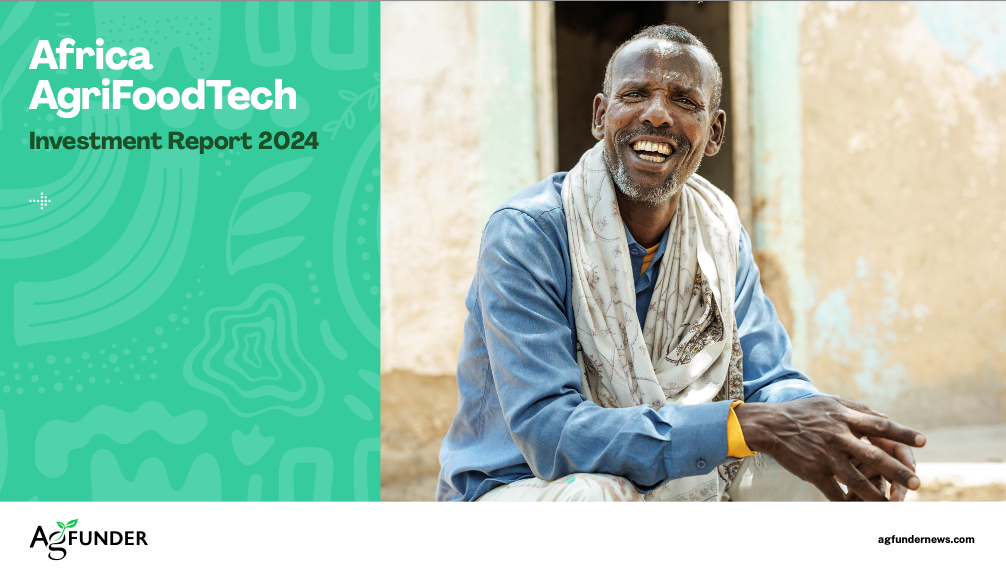
The Africa AgriFoodTech Investment Report 2024 suggests that this modest uptick signals a potential recovery in investment for startups transforming the continent's agriculture and food sectors. This follows a significant decline in 2023. Last year, funding plunged by 62% to $275 million after strong performances in 2022 and 2021, when investments reached $732 million and $531 million, respectively.
This year’s slight rise in funding from January to June came alongside a 27% year-on-year drop in deal volume, with only 39 transactions recorded. This points to investors’ increased caution, favoring more mature AgriFoodTech startups over early-stage ventures.
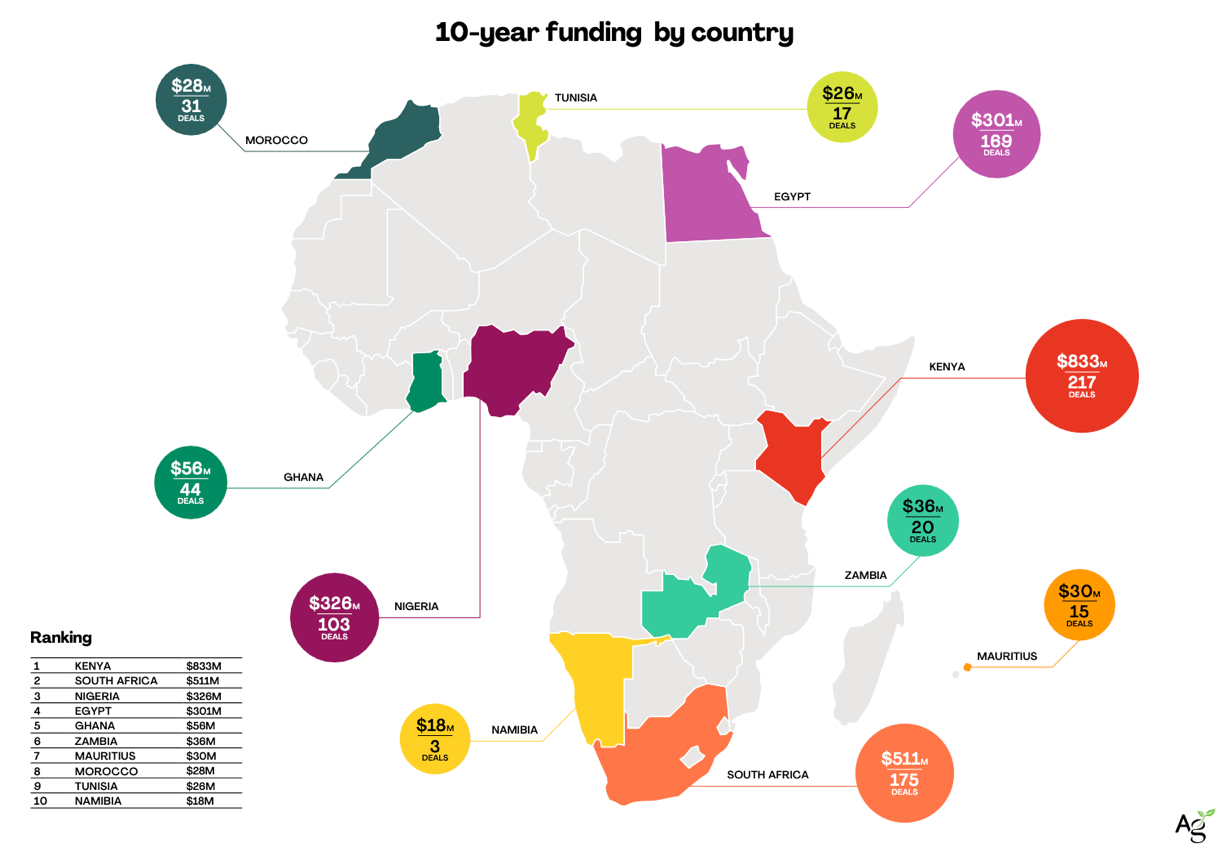
Investment distribution reveals a strong focus on a few key countries, with Kenya leading, securing $83 million across 19 deals—over half of all recorded funding. Egypt and Nigeria followed, raising $24 million and $15 million, respectively.
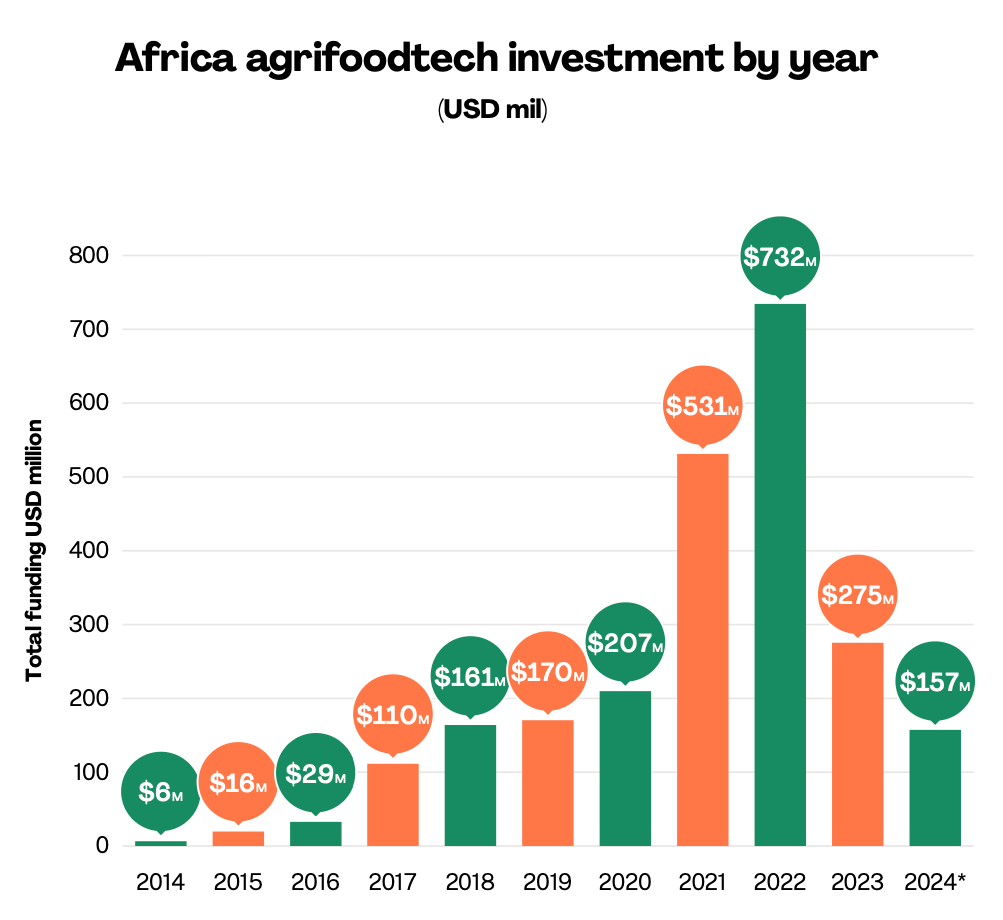
In terms of sector focus, fintech and marketplaces captured 41% of the total funding, while startups specializing in innovative agricultural equipment, such as robotics and mechanization, attracted 17.5%. Mid-value chain startups—focusing on food safety, traceability, logistics, transportation, and processing—received 15% of the funds raised in the first half of 2024.
The report also highlights that African AgriFoodTech companies have received a cumulative $2.4 billion in investment over the decade from 2014 to 2023. However, funding remains concentrated in key tech hubs. Kenya stands out as a “hotspot” for agro-innovation, leading the pack with $833 million in funding over the past decade, followed by South Africa ($511 million), Nigeria ($326 million), and Egypt ($310 million). Together, these four countries account for 88% of all AgriFoodTech startup funding on the continent.




